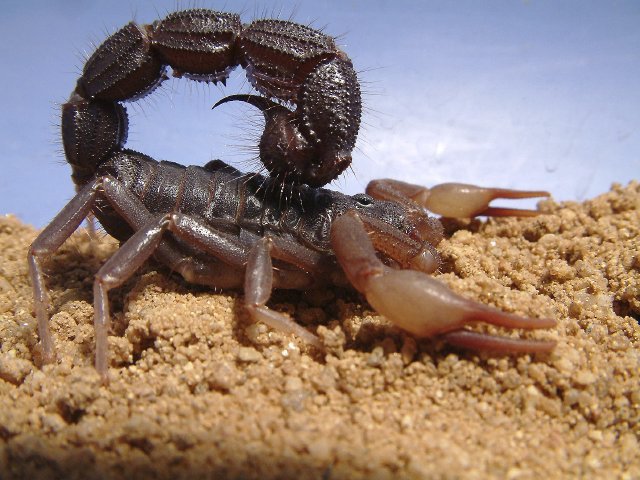
Think of the fat-tailed scorpion like a hidden gem in the animal kingdom. While it may look unassuming—or even kind of cute—this creature possesses venom that can be quite potent. Before you start picturing a scene straight out of an action movie, let’s break down the facts about its toxicity, the risks involved, and why knowing about it is essential if you’re in an area where these critters reside.
What Is The Fat-Tailed Scorpion?
The fat-tailed scorpion, known scientifically as *Androctonus*, is native to arid regions, particularly in Africa and the Middle East. These scorpions are distinct due to their thick tail that tapers off into a stinger, giving them a rather menacing appearance.
Typically, you can spot a fat-tailed scorpion in hues ranging from yellowish to brownish shades, helping them blend seamlessly into their sandy environments. This camouflage is crucial for hunting and avoiding predators. Now, you might be wondering why exactly this scorpion is infamous in the scorpion world. It’s primarily because of its potent venom and its ability to deliver a sting that could have serious implications for humans and animals alike.
How Dangerous Is The Fat-Tailed Scorpion?
Here’s the thing: while the fat-tailed scorpion is indeed venomous, the level of danger it poses can depend on several factors. In general, its venom is highly toxic and can lead to significant medical issues, especially if left untreated.
When a fat-tailed scorpion stings, the venom can cause symptoms such as intense pain, swelling, and muscle spasms. More severe reactions might include difficulty breathing and even heart issues, particularly in vulnerable populations like children or the elderly. However, fatalities are rare, especially with prompt medical attention. So, while a sting from this scorpion can be serious, the actual risk of dying from it is quite low for most healthy adults.
Understanding Fat-Tailed Scorpion Venom
The venom of the fat-tailed scorpion contains a cocktail of different toxins, each with its purpose. This venom is primarily neurotoxic, meaning it affects the nervous system. It can disrupt normal nerve signaling, leading to that intense pain and other reactions we talked about.
Interestingly, researchers are also studying the potential uses of this venom. There’s ongoing research into how these toxins could be harnessed in the medical field, particularly in cancer treatment. So, while this scorpion’s sting can hurt, it’s also opening doors to potential medical advancements. You might not want to handle one for fun, but the science behind it is pretty fascinating!
How to Avoid Fat-Tailed Scorpions
Prevention is key! If you’re in an area where fat-tailed scorpions are common, there are some steps you can take to minimize your risk of a sting:
- Wear protective clothing when walking in the desert or rocky areas—closed shoes can be a lifesaver.
- Shake out shoes and clothing before putting them on; scorpions sometimes crawl into places looking for shelter.
- Use a flashlight at night when outdoors since these critters are nocturnal and tend to be more active after dark.
- Seal potential entry points around your home to prevent them from getting inside.
Taking simple precautions can make a big difference. It’s all about being vigilant and prepared!
What To Do If You’re Stung
Okay, let’s say the worst has happened—you’ve been stung by a fat-tailed scorpion. First off, don’t panic! It’s crucial to stay calm. Here’s what you should do:
1. Call for help—Get someone else to call a medical professional or take you to the ER, especially if the sting is severe.
2. Keep the sting site still—This can help slow down the spread of venom.
3. Apply a cold compress—This can help with the pain and swelling.
4. Take pain relievers—Over-the-counter medications like ibuprofen or acetaminophen can ease discomfort.
It’s always best to err on the side of caution when it comes to these things. The sooner you get treatment, the better.
Are There Other Poisonous Scorpions?
You might be wondering, “Are all scorpions as dangerous as the fat-tailed one?” The truth is, not all scorpions are created equal. While many scorpions have venom, the fat-tailed scorpion, specifically *Androctonus*, is among the most venomous.
Comparison of Scorpion Venom:
| Scorpion Name | Venom Toxicity | Potential Human Effect |
| Fat-Tailed Scorpion | Highly Toxic | Severe pain, potential heart issues |
| Common Yellow Scorpion | Moderately Toxic | Localized pain, mild reactions |
| Arizona Bark Scorpion | Very Toxic | Severe pain, rare fatalities |
While some scorpions are quite harmless, knowing which ones pose a real threat can help you stay safe.
So, is the fat-tailed scorpion poisonous or dangerous? Yes, it’s both! With potent venom that can lead to serious reactions, it’s important to treat this creature with respect—and also to keep your distance. Understanding the risks and taking preventative measures can help you safely enjoy nature without fear.
Remember, knowledge is power. By being informed about the characteristics and behaviors of the fat-tailed scorpion, you can navigate its territory with confidence. Stay safe out there!

